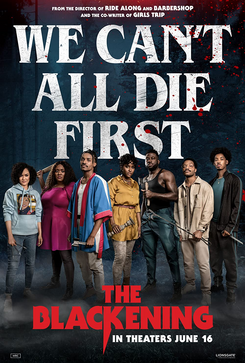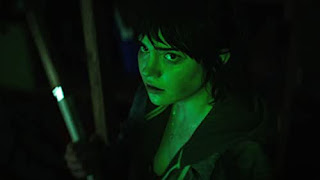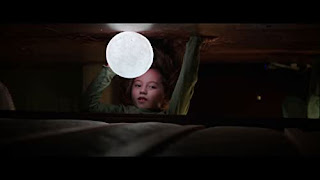SPIDER-MAN:
ACROSS THE SPIDER-VERSE
It is difficult to be the voice of dissent, the one who says, "No", the one who argues against the near-fanatical cries of the majority. I am not a dissenter by choice or desire. I speak what I see. When it comes to the reaction many have towards Spider-Man: Across the Spider-Verse, a line in Akira Kurosawa's RAN comes to mind: "In an mad world, only the mad are sane".
I am not "mad" in the angry or insane manner (at least I hope not in the latter). However, I probably will be declared as such by those who have proclaimed Spider-Man: Across the Spider-Verse as "one of the greatest films ever made in the history of cinema" and "peak cinema". Spider-Man: Across the Spider-Verse is not a bad film per se, but it is not this generation's Citizen Kane, not even close.
As a side note, I am curious to know if those declaring Across the Spider-Verse "one of the greatest films ever made in the history of cinema" have ever even heard of either Citizen Kane or RAN, let alone seen them.
It has been five years since the events of Spider-Man: Into the Spider-Verse, and our friendly neighborhood Spider-Man Miles Morales (Shameik Moore) is still struggling to balance his life as a Brooklyn teen with being a superhero. His parents Jeff Morales (Bryan Tyree Henry) and Rio (Luna Lauren Velez) worry about what is to become of their distracted son.
If only they knew what he really was up against. Not only is he facing off against a villain he initially dismisses as "the villain of the week" known as The Spot (Jason Schwartzman) but now back from another universe comes Gwen Stacy aka Spider-Woman (Hailee Steinfeld). She has her own issues in her universe, what with her dad Captain Stacy (Shea Whigham) thinking "Spider-Woman" killed Gwen's friend Peter Parker. Gwen, now having left her universe, is part of a special team of Spider-Beings who must prevent anomalies in the various Spider-Verses.
Miles secretly goes to Mumbahattan, where the cocky Indian Spider-Man, Pavitr Pravhakar (Karan Soni) resides. Miles saves Pavitr's girlfriend's father Sergeant Singh, but that begins the collapse of this universe. Whisked away to the Spider-Society HQ, Miles reencounters his unofficial mentor Peter B. Parker (Jake Johnson) and Miguel O'Hara/Spider-Man 2099 (Oscar Isaac). Miles' meddling has prevented a "Canon event", something that needed to happen to have that world's Spider-Man be whom he was destined to be.
It is now that Miles learns his "Canon event": the death of his father after he rises from Sergeant to Captain. He is determined to stop it, and if it means fighting off every Spider-Being, he will do so. Even the news that Miles was already an anomaly due to being bitten at all, let alone by the wrong spider, cannot dissuade him from saving future Captain Morales. Unfortunately, Miles ends up in the wrong universe, one where his uncle Aaron (Mahershala Ali) is still alive and works for the supervillain known as The Prowler. In a shocking twist, The Prowler is none other than Miles Morales! Now, a myriad of Spider-Beings must join forces to save the non-Prowler Miles.
That is a lot of plot for what is essentially the second part of a two-part film (the third film Beyond the Spider-Verse scheduled for next year). One element that I found extraordinary was that Across the Spider-Verse is proud to spend so much time on almost anything that does not involve the central plot (Miles attempting to stop his Canon event). The first twenty minutes, which are also the pre-title scenes, revolve around Spider-Gwen. The next twenty to thirty minutes revolve around Miles' domestic issues, down to being late for his parents' party. If my calculations are correct, that means it is almost a full hour in this two-hour twenty-minute film before we get Gwen and Miles to reunite.
That, in turn, leads to extended sequences involving the Indian Spider-Man which in turn throws in Hobie Brown aka Spider-Punk (Daniel Kaluuya) which leads to finally getting Miles to Spider-Central. I, for my part, cannot be convinced that so much could have been cut or trimmed to move the story forward.
Here though, I imagine the fans who have declared Across the Spider-Verse their generation's Citizen Kane do not care. They are getting a glut of Spider-People, down to the live-action versions via archival footage. However, I found that there can be too much of a thing, good or bad.
I will grant that the animation itself is quite beautiful. It also, like in Into the Spider-Verse, manages to blend the various styles well, sometimes in the same scene, without being jarring. There are impressive sequences in Across the Spider-Verse that the viewer will enjoy.
However, what apart from the look, or looks, of the film does Across the Spider-Verse offer? There is certainly a lot and I do mean A LOT of spectacle but I cannot find logic to having taken up so much time with unnecessary things. The comedy bits where Miles has to both fight The Spot (who is forgotten for almost the whole movie) and his various encounters with crime that delay him to the school meeting did not work for me.
I was puzzled over Miles' "Canon event". I thought his was Uncle Aaron's death, not his father's impending one. Wasn't it after Aaron died that Miles adopted his Spider-Man mantle? Moreover, given that his father's last name is "Morales", isn't Jeff already Hispanic? How is Miles "biracial" when from what I can see, both his parents are Latino? I could go with Afro-Latino, but how is he "half-black, half-Puerto Rican" when again, "Morales" is a Hispanic surname and thus, makes his father at least part-Hispanic?
Across the Spider-Verse is at times very frenetic, particularly in the Mumbahattan section as various Spider-People come across, or when Miles is finally at Spider-HQ to meet the intimidating Miguel O'Hara. That perhaps should be expected, as Into the Spider-Verse had that same manner. I just think that in that film, the various reprises to their separate origin stories were more lighthearted. Here, it was just repetitive.
I figure some scenes were just there to set up characters for Beyond the Spider-Verse (why have a LEGO Spider-Man when he literally added nothing to Across the Spider-Verse), but why not just include them at Spider-HQ?
At one point in Across the Spider-Verse, I literally wrote in all caps, "THIS IS BORING" and I stand by that. Across the Spider-Verse is not "one of the greatest films ever made in the history of cinema". Not even close. It is a wildly visually arresting film but far too long for being essentially a midpoint in a trilogy.






_poster.jpg)




_online.jpg)









